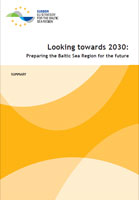Preparing the Baltic Sea Region for the future (short version)
Looking towards 2030. We can’t predict the future, but we can prepare for it. The report is a contribution to preparations for a future where many of the challenges and opportunities the Baltic Sea Region will meet would be better addressed through deepened cooperation. Various developments impact the way we will live, interact and work around. Specific trends concerning markets, technologies and policies concern the Baltic Sea Region. The question we must ask ourselves is whether the Baltic Sea Region will be among those affected by, or among those shaping the future?
This report is based on a review of 35 trends, all of which have implications for the cooperation in the Baltic Sea Region and EU Strategy for the Baltic Sea Region (EUSBSR). The trends fall under the following themes:
- Changing demographic pressures and flows.
- Renewing industries and innovation.
- Deepening the environmental conversation.
- Changing democratic decision making and governance.
The following areas are concluded for intensified cooperation:
- Increasing focus on environmental and climate challenges as they can only be mastered jointly. Current efforts are not sufficient to meet the objectives of the EUSBSR.
- Strengthened joint civil protection because effective civil protection systems around the Baltic Sea require multi-sector cooperation across countries as crises and threats do not stop at borders.
- Blue growth concerns common resources of the Baltic Sea with important implications for economic and environmental EUSBSR objectives.
- Increased oversight of shipping transport to ensure that increasing transport volumes do not counteract the objectives on clean and safe shipping and that they contribute to competitiveness.
- Safeguard long-term cooperation cultures, since recent trends may obstruct the operational cooperation that is a key to the success of EUSBSR.
Looking towards 2030: Preparing the Baltic Sea Region for the future. Short version.

- Publikationsnummer:
- Info 0659
- ISBN:
- 978-91-87903-77-9
- Årtal:
- 2016
- Länk till rapport:
- Hämta publikationen (pdf) Pdf, 967.3 kB.
